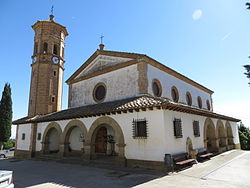Igriés is a small village located in the Hoya de Huesca, in the province of Aragón in northern Spain.
Igriés, Spain | |
|---|---|
 | |
 | |
| Country | Spain |
| Autonomous community | Aragon |
| Province | Huesca |
| Municipality | Igriés |
| Population (2018)[1] | |
• Total | 705 |
| Time zone | UTC+1 (CET) |
| • Summer (DST) | UTC+2 (CEST) |
Geography
editSituated south of the Pyrenees, about nine kilometers to the north of Huesca, along the road to Sabiñánigo, in the valley of the river Isuela, and near the Satocobá mountain. The municipality of Igriés also includes the small village of Yéqueda.
History
editIgriés was first mentioned in 1104, by the Bishop of Huesca and Montearagón. (Ubieto Arteta, Cartulario de Montearagón, nº. 38)
Politics
edit| Term | Name | Party | |
|---|---|---|---|
| 1995-1999 | Inmaculada Oliván Lample | Partido Popular | |
| 1999-2003 | Mariajose Ordás Arnal | Partido Popular | |
| 2003-2007 | Constancio Calvo Sanmartín | Partido Popular | |
| 2007-2011 | Constancio Calvo Sanmartín | Partido Aragonés |
Demographics
edit| 1900 | 1910 | 1930 | 1940 | 1950 | 1960 | 1970 | 1981 | 1986 | 1992 | 1999 | 2004 | 2005 | 2007 | |
|---|---|---|---|---|---|---|---|---|---|---|---|---|---|---|
| 442 | 453 | 410 | 339 | 316 | 252 | 190 | 198 | 181 | 179 | 199 | 362 | 415 | 514 |
Notable Locations
editIgriés is home to the Hermitage of San Juan, dating to the 12th century. A military base shares the village's name, and is nearby.
References
edit- ^ Municipal Register of Spain 2018. National Statistics Institute.
External links
edit42°13′N 0°26′W / 42.217°N 0.433°W